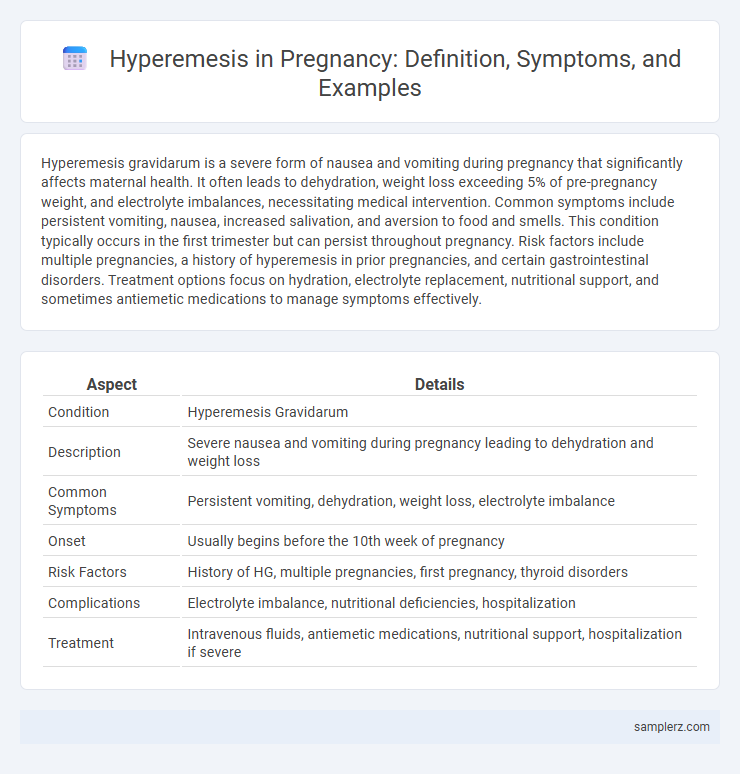Hyperemesis gravidarum is a severe form of nausea and vomiting during pregnancy that significantly affects maternal health. It often leads to dehydration, weight loss exceeding 5% of pre-pregnancy weight, and electrolyte imbalances, necessitating medical intervention. Common symptoms include persistent vomiting, nausea, increased salivation, and aversion to food and smells. This condition typically occurs in the first trimester but can persist throughout pregnancy. Risk factors include multiple pregnancies, a history of hyperemesis in prior pregnancies, and certain gastrointestinal disorders. Treatment options focus on hydration, electrolyte replacement, nutritional support, and sometimes antiemetic medications to manage symptoms effectively.
Table of Comparison
| Aspect | Details |
|---|---|
| Condition | Hyperemesis Gravidarum |
| Description | Severe nausea and vomiting during pregnancy leading to dehydration and weight loss |
| Common Symptoms | Persistent vomiting, dehydration, weight loss, electrolyte imbalance |
| Onset | Usually begins before the 10th week of pregnancy |
| Risk Factors | History of HG, multiple pregnancies, first pregnancy, thyroid disorders |
| Complications | Electrolyte imbalance, nutritional deficiencies, hospitalization |
| Treatment | Intravenous fluids, antiemetic medications, nutritional support, hospitalization if severe |
Understanding Hyperemesis Gravidarum in Pregnancy
Hyperemesis Gravidarum is a severe form of nausea and vomiting during pregnancy affecting approximately 0.3-3% of pregnant women, leading to dehydration, weight loss, and electrolyte imbalances. This condition often requires medical intervention, including intravenous fluids, antiemetic medications, and nutritional support to ensure maternal and fetal health. Early diagnosis and management are crucial to prevent complications such as Wernicke's encephalopathy and preterm birth.
Key Symptoms of Severe Morning Sickness
Severe morning sickness, known as hyperemesis gravidarum, manifests through persistent vomiting, dehydration, and rapid weight loss exceeding 5% of pre-pregnancy body weight. Key symptoms include intense nausea that disrupts daily activities, electrolyte imbalances causing fatigue or dizziness, and inability to retain fluids or food. Early recognition of these signs is crucial for timely medical intervention to prevent complications such as malnutrition and hospitalization.
Common Triggers of Hyperemesis During Pregnancy
Common triggers of hyperemesis gravidarum during pregnancy include hormonal fluctuations, particularly elevated levels of human chorionic gonadotropin (hCG) and estrogen. Nutritional deficiencies and gastrointestinal sensitivities can exacerbate symptoms, leading to severe nausea and vomiting. Stress and certain odors or foods are also frequently reported as catalysts that intensify hyperemesis episodes in expectant mothers.
Case Study: Real-Life Experiences with Hyperemesis
A case study of hyperemesis gravidarum highlights a 28-year-old pregnant woman experiencing severe nausea and vomiting, resulting in weight loss exceeding 5% of her pre-pregnancy body weight. Despite standard treatments such as antiemetics and intravenous hydration, her symptoms persisted for weeks, leading to hospitalization and nutritional support via a feeding tube. This real-life experience underscores the importance of early diagnosis and comprehensive management strategies in severe pregnancy-related nausea.
Differences Between Morning Sickness and Hyperemesis
Morning sickness typically involves mild nausea and occasional vomiting during early pregnancy, affecting up to 70% of pregnant women, whereas hyperemesis gravidarum is a severe condition marked by persistent vomiting, dehydration, and weight loss requiring medical intervention. Unlike common morning sickness, hyperemesis gravidarum can lead to electrolyte imbalances and hospitalization in about 0.5%-2% of pregnancies. Early diagnosis and treatment are crucial to prevent complications such as malnutrition and fetal growth restriction.
Risk Factors for Developing Hyperemesis Gravidarum
Risk factors for developing hyperemesis gravidarum include a history of hyperemesis in previous pregnancies, multiple gestations such as twins or triplets, and certain medical conditions like thyroid disorders or gastrointestinal diseases. Women younger than 30 years and those with a family history of hyperemesis gravidarum also face higher susceptibility. Elevated levels of human chorionic gonadotropin (hCG) and estrogen may contribute to the severity of symptoms.
Impact of Hyperemesis on Maternal and Fetal Health
Hyperemesis gravidarum severely affects maternal health by causing extreme dehydration, electrolyte imbalances, and significant weight loss, potentially leading to hospitalization. Fetal health risks include low birth weight, preterm birth, and developmental delays due to inadequate maternal nutrition. Early medical intervention and nutritional support are crucial to mitigating these adverse outcomes in pregnancy complicated by hyperemesis.
Effective Management Strategies for Hyperemesis
Effective management strategies for hyperemesis gravidarum include intravenous fluid replacement to prevent dehydration, antiemetic medications such as ondansetron or metoclopramide to control severe nausea and vomiting, and nutritional support through enteral feeding if oral intake is insufficient. Early intervention with a multidisciplinary approach involving obstetricians, dietitians, and mental health professionals can improve maternal and fetal outcomes. Close monitoring of electrolyte imbalances and weight loss is crucial for tailoring treatment plans and preventing complications.
Nutritional Support for Pregnant Women with Hyperemesis
Nutritional support for pregnant women with hyperemesis gravidarum involves tailored interventions to prevent dehydration, electrolyte imbalances, and weight loss, often including intravenous fluids and vitamin supplementation such as thiamine. Small, frequent meals rich in complex carbohydrates and avoiding strong odors help improve tolerance and nutrient intake. Enteral feeding may be necessary in severe cases to ensure adequate fetal growth and maternal health.
When to Seek Medical Help for Hyperemesis in Pregnancy
Severe nausea and vomiting during pregnancy, known as hyperemesis gravidarum, requires immediate medical attention if symptoms include persistent vomiting leading to dehydration, weight loss exceeding 5% of pre-pregnancy weight, or inability to keep any fluids down for more than 24 hours. Urgent consultation with a healthcare provider is critical when experiencing dizziness, fainting, or dark urine, indicating potential electrolyte imbalance or kidney issues. Early intervention with IV fluids, nutritional support, and antiemetic medications can prevent complications and ensure the safety of both mother and baby.

example of hyperemesis in pregnancy Infographic
 samplerz.com
samplerz.com